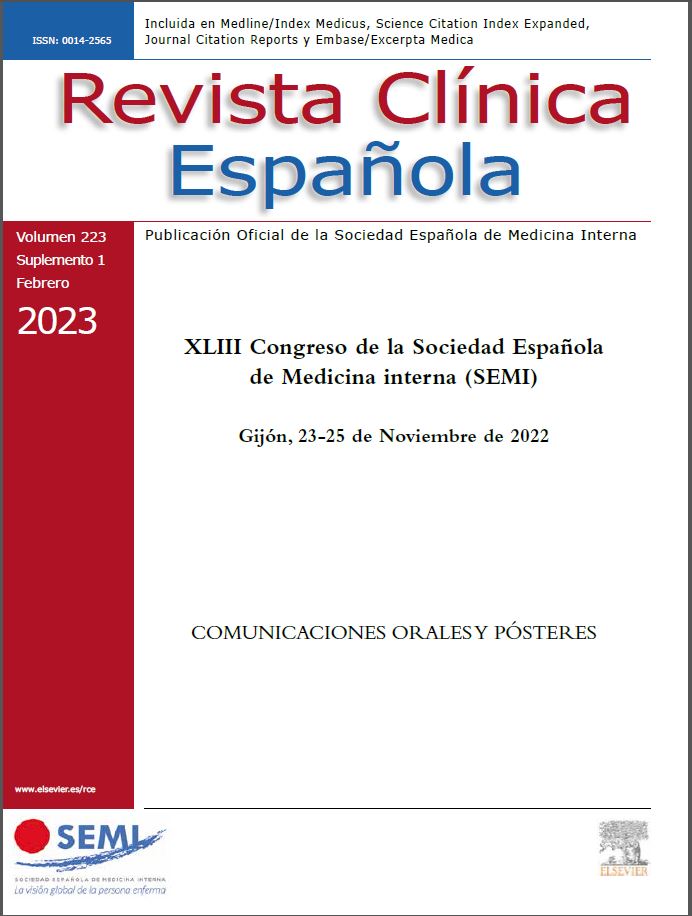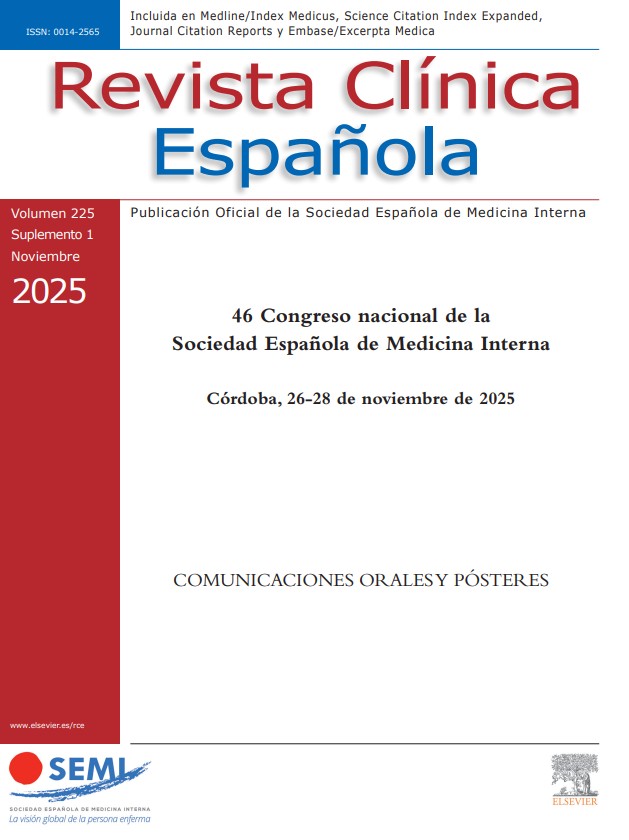567 - ANTICOAGULANTES DE ACCIÓN DIRECTA EN EL SÍNDROME ANTIFOSFOLÍPIDICO: LA UTILIDAD POR DESCUBRIR. REVISIÓN SISTEMÁTICA
1Hospital Universitario Virgen Macarena, Sevilla. 2Hospital Universitario Virgen del Rocío, Sevilla.
Objetivos: El síndrome antifosfolipídico (SAF) es una entidad clínica caracterizada por un estado de hipercoagulabilidad, que provoca eventos trombóticos venosos, arteriales y de pequeño vaso, así como patología obstétrica. El tratamiento se basa en el uso de anticoagulantes antivitamina K. Existe controversia acerca del uso de anticoagulantes orales de acción directa (ACOD) en el SAF. El objetivo de esta revisión será el estudio la de las publicaciones de ACOD en el SAF en relación al pronóstico y la morbilidad asociada (eventos trombóticos, manifestaciones hemorrágicas), con el fin de detectar aquellos pacientes que más se puedan beneficiar de esta terapia anticoagulante.
Métodos: Revisión sistemática de las publicaciones entre enero de 2012 y el 23 de febrero de 2022, excluyendo casos clínicos o series de casos, que incluyan eventos pronósticos o efectos secundarios de anticoagulantes de acción directa con o sin comparación con otra terapia anticoagulante. Se incluyen las comunicaciones a congreso, siguiendo los criterios anteriores, entre 2019 y 2021. La búsqueda bibliográfica se ha realizado a través de PubMed, Cochrane Library, EMBASE, Scopus. Como control de calidad se han seguido las directrices de Preferred Reporting Items for Systematic Review and Meta analysis (PRISMA).
Resultados: Inicialmente se identificaron 789 publicaciones. Para la revisión final se incluyeron 22 publicaciones (4 ensayos clínicos, 11 estudios observacionales, 7 metaanálisis). El diagrama de flujo, así como un análisis detallado de las mismas, se expondrá en caso de ser aceptada la comunicación. 14 de los estudios mencionados, incluyendo 3 ensayos clínicos y 5 metaanálisis, muestran superioridad de los antivitamina K frente a los ACOD. De los 8 estudios de los que se podrían extraer conclusiones favorables a favor de ACOD (pacientes de bajo riesgo con antecedentes de trombosis venosa), ninguno muestra superioridad frente a antivitamina K. Un resumen visual de las publicaciones se muestra en la figura.

Discusión: En algunos estudios, se concluye que los ACOD podrían ser utilizados con seguridad en pacientes de bajo riesgo (podrían considerarse aquellos con antecedente de trombosis venosa y simples positivos como perfil serológico). Sin embargo, la ausencia de superioridad en los estudios frente a vitamina K, y la inferioridad de los mismos en pacientes de alto riesgo o con antecedentes de trombosis arteriales, podría hacer concluir que, salvo situaciones especiales (mal control de INR, intolerancia a vitamina K) queden relegados a un segundo escalón.
Conclusiones: En el SAF, La prevención secundaria de eventos trombóticos debe basarse en el uso de antivitamina K. No hay suficiente evidencia para recomendar el uso de ACOD en ninguna circunstancia, más allá de una mala tolerancia o mal control de INR con el uso de antivitamina K. La realización de ensayos clínicos futuros está limitada por los resultados obtenidos en los estudios publicados hasta la fecha.
Bibliografía
- Miyakis S, Lockshin MD, Atsumi T, Branch DW, Brey RL, Cervera R, et al. International consensus statement on an update of the classification criteria for definite antiphospholipid syndrome (APS). J Thromb Haemost. 2006;4(2):295-306.
- Petri M. Antiphospholipid Syndrome. Transl Res. 2020;225:70.
- Cervera R, Rodríguez-Pintó I, Espinosa G. The diagnosis and clinical management of the catastrophic antiphospholipid syndrome: A comprehensive review. J Autoimmun. 2018;92:1-11.
- Tektonidou MG, Andreoli L, Limper M, Amoura Z, Cervera R, Costedoat-Chalumeau N, et al. EULAR recommendations for the management of antiphospholipid syndrome in adults. Ann Rheum Dis. 2019;78(10):1296-304.
- Cohen H, Cuadrado MJ, Erkan D, Duarte-Garcia A, Isenberg DA, Knight JS, et al. 16th International Congress on Antiphospholipid Antibodies Task Force Report on Antiphospholipid Syndrome Treatment Trends. Lupus. 2020;29(12):1571-93.
- Franco Moreno AI, Martín Díaz RM, García Navarro MJ. Direct oral anticoagulants: An update. Med Clin (Barc). 2018;151(5):198-206.
- Moher D, Liberati A, Tetzlaff J, Altman DG, Altman D, Antes G, et al. Preferred reporting items for systematic reviews and meta-analyses: the PRISMA statement. PLoS Med. 2009;6(7).
- Yang P, Shim M, Kang S, Kim S, Kim W, Moon J, et al. Effectiveness and safety of non-vitamin K antagonist oral anticoagulants in atrial fibrillation patients with antiphospholipid syndrome: a nationwide cohort study. Eur Heart J. 2020;41(Supplement_2).
- Cohen H, Hunt BJ, Efthymiou M, Arachchillage DRJ, Mackie IJ, Clawson S, et al. Rivaroxaban versus warfarin to treat patients with thrombotic antiphospholipid syndrome, with or without systemic lupus erythematosus (RAPS): a randomised, controlled, open-label, phase 2/3, non-inferiority trial. Lancet Haematol. 2016;3(9):e426-36.
- Pengo V, Denas G, Zoppellaro G, Jose SP, Hoxha A, Ruffatti A, et al. Rivaroxaban vs. warfarin in high-risk patients with antiphospholipid syndrome. Blood. 2018;132(13):1365-71.
- Pengo V, Hoxha A, Andreoli L, Tincani A, Silvestri E, Prisco D, et al. Trial of Rivaroxaban in AntiPhospholipid Syndrome (TRAPS): Two-year outcomes after the study closure. J Thromb Haemost. 2021;19(2):531-5.
- Ordi-Ros J, Sáez-Comet L, Pérez-Conesa M, Vidal X, Riera-Mestre A, Castro-Salomó A, et al. Rivaroxaban Versus Vitamin K Antagonist in Antiphospholipid Syndrome: A Randomized Noninferiority Trial. Ann Intern Med. 2019;171(10):685-94.
- Woller SC, Stevens SM, Kaplan DA, Branch DW, Aston VT, Wilson EL, et al. Apixaban for the Secondary Prevention of Thrombosis Among Patients With Antiphospholipid Syndrome: Study Rationale and Design (ASTRO-APS). Clin Appl Thromb Hemost. 2016;22(3):239-47.
- Noel N, Dutasta F, Costedoat-Chalumeau N, Bienvenu B, Mariette X, Geffray L, et al. Safety and efficacy of oral direct inhibitors of thrombin and factor Xa in antiphospholipid syndrome. Autoimmun Rev. 2015;14(8):680-5.
- Resseguier AS, Pereira B, Rieu V, Le Guenno G, Grobost V, Ruivard M. Direct oral anticoagulants: an alternative treatment for thrombotic antiphospholipid syndrome? Lupus. 2017;26(12):1297-303.
- Sato T, Nakamura H, Fujieda Y, Ohnishi N, Abe N, Kono M, et al. Factor Xa inhibitors for preventing recurrent thrombosis in patients with antiphospholipid syndrome: a longitudinal cohort study. Lupus. 2019;28(13):1577-82.
- Malec K, Broniatowska E, Undas A. Direct oral anticoagulants in patients with antiphospholipid syndrome: a cohort study. Lupus. 2020;29(1):37-44.
- Vardanyan S, Ginosyan K, Vardanyan V, Sargsyan A, Simonyan A. SAT0194 lack of efficacy of rivaroxaban in the treatment of antiphospholipid syndrome and clinical significance of antiphospholipid antibodies. Ann Rheum Dis. 2020;79(Suppl 1):1039.
- Kwan V, Kaplovitch E, Selby R, Abdulrehman J. Effectiveness and Safety of the Direct Oral Anticoagulants in Low-Risk Antiphospholipid Syndrome: A Case Series. Blood. 2020;136(Supplement 1):16-7.
- Elsebaie MA, Wickham ZA, Debragga S, Li J, Gaddh M. Comparative Analysis of Direct Oral Anticoagulants and Vitamin K Antagonists in Antiphospholipid Syndrome Patients. Blood. 2021;138(Suppl. 1):2135.
- Dufrost V, Risse J, Reshetnyak T, Satybaldyeva M, Du Y, Yan XX, et al. Increased risk of thrombosis in antiphospholipid syndrome patients treated with direct oral anticoagulants. Results from an international patient-level data meta-analysis. Autoimmun Rev. 2018;17(10):1011-21.
- Sanchez-Redondo J, Espinosa G, Varillas Delgado D, Cervera R. Recurrent Thrombosis With Direct Oral Anticoagulants in Antiphospholipid Syndrome: A Systematic Literature Review and Meta-analysis. Clin Ther. 2019;41(9):1839-62.
- Bala MM, Celinska-Lowenhoff M, Szot W, Padjas A, Kaczmarczyk M, Swierz MJ, et al. Antiplatelet and anticoagulant agents for secondary prevention of stroke and other thromboembolic events in people with antiphospholipid syndrome. Cochrane Database Syst Rev. 2020;10(10).
- Cerdà P, Becattini C, Iriarte A, Hernández JC, Corbella X, Riera-Mestre A. Direct oral anticoagulants versus vitamin K antagonists in antiphospholipid syndrome: A meta-analysis. Eur J Intern Med. 2020;79:43-50.
- Dufrost V, Darnige L, Reshetnyak T, Vorobyeva M, Jiang X, Yan X xin, et al. New Insights into the Use of Direct Oral Anticoagulants in Non-high Risk Thrombotic APS Patients: Literature Review and Subgroup Analysis from a Meta-analysis. Curr Rheumatol Rep. 2020;22(7).
- Dufrost V, Wahl D, Zuily S. Direct oral anticoagulants in antiphospholipid syndrome: Meta-analysis of randomized controlled trials. Autoimmun Rev. 2021;20(1).
- Koval N, Alves M, Plácido R, Almeida AG, Fonseca JE, Ferreira JJ, et al. Direct oral anticoagulants versus vitamin K antagonists in patients with antiphospholipid syndrome: systematic review and meta-analysis. RMD open. 2021;7(2).








